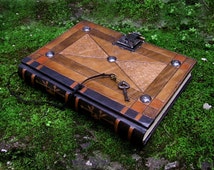 |
| Image: Teo Studio, www.etsy.com/shop/TeoStudio |
Journaling is especially helpful for voice-driven writers who first need to get inside the protagonist’s head before planning any story events. It can also be a way for you to mentally process key parts of your plot. When preparing for revision, it can be a helpful way to think through what is and isn’t working in a manuscript. It’s also a great warm-up for beginning any writing session, especially if you’ve been away from the manuscript for a period.
Journaling exercises
• Journal your key characters’ important memories that shaped them most
• Journal about your key characters’ deepest fears
• Journal about your key characters’ ambitions and dreams
• Journal about your protagonist’s bucket list
• Journal your protagonist’s opinions of other characters
• Journal your antagonist’s view of the protagonist
• Journal about your protagonist from the viewpoint of another key character
• Journal a fiasco moment in your character’s voice
• Journal about a moment your character would feel empowered
• Journal about potential plot events as a character might experience them
• Journal about conflicts among characters
• Journal your protagonist’s impressions of key settings in your story
• Journal a basic arc of your story in your protagonist’s voice
• Journal your impressions of each character in your story
• Journal about scenes that are almost ready, and how you might polish them
• Journal about problem scenes and how you might repair or replace them
• Journal your hopes about this manuscript
• Journal your concerns about this manuscript
How might journaling help you keep moving forward with a project?








Great idea. Some of those thoughts in a journal might definitely help get through stuck spots in a manuscript, but at the very least they'll keep the words flowing. Super warm up exercise.
ReplyDeleteIndeed, it is a great way to get going in a writing session. I've found journaling especially helpful when approaching revisions and I have several equally good ideas--I "talk them out" to myself on paper, weighing pros and cons. Sometimes I journal as the protagonist, and let her opinions guide the direction of the revision.
Delete